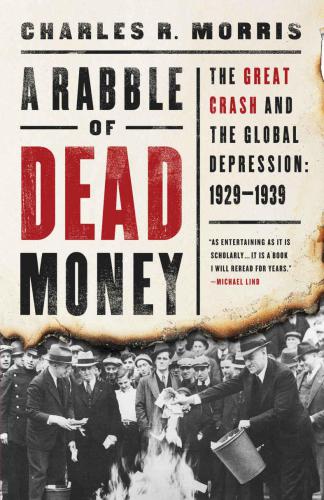
A Rabble of Dead Money
The Great Crash and the Global Depression: 1929-1939
کتاب های مرتبط
- اطلاعات
- نقد و بررسی
- دیدگاه کاربران
نقد و بررسی

January 23, 2017
In this sprightly—if strangely titled—volume, Morris (Comeback: America’s New Economic Boom) recounts a major 20th-century crisis. Morris characterizes himself as a “historian with a professional background in finance,” and he is at his best when writing about economic matters, alerting readers to the latest, most authoritative thinking about the causes and realities of the Great Depression. He sets his main story’s stage with a long introduction on the 1920s, which takes up a third of the book, and eventually hits his stride in the midst of the Depression. The usual characters—Herbert Hoover and F.D.R. especially—make their necessary appearances, but part of the book’s distinctiveness lies in Morris’s inclusion of little-known people, not all of them American, such as Chicago businessman Samuel Insull and the “Swedish Match King” Ivar Kreuger. Another of its strengths is that Morris goes beyond American shores to cover the Depression’s roots in, and effects on, the rest of the world. There’s not much new here, but what Morris delivers is dependably accurate, well paced, and easy to read. This is an ideal book for readers seeking an introduction to the Depression years, though Eric F. Goldman’s classic Rendezvous with Destiny remains essential reading.

January 1, 2017
Morris (Comeback: America's New Economic Boom, 2013, etc.) revisits history's greatest economic meltdown.The phenomenon of the Great Depression is too vast and complex for a single book to capture entirely. Where to begin? How about with Morris, if only because he does such an efficient job laying the groundwork for an understanding of the economic disaster. Clearly familiar with the library of "Depression studies," the author, a lawyer and former banker, makes good use of the historians and economists who've gone before. He begins by tracing the roots of the Depression to World War I, the devastation that accounted for the desperate efforts of the United States, Britain, France, and Germany to fashion a new, acceptable order in the wake of massive loss. Focusing on the U.S. but keeping an eye on the European scene, Morris writes smoothly and moves at a breakneck pace, packing the narrative with quick profiles of auto titans, utilities giants, and international businessmen and entrepreneurs and drilling down on the economic maneuverings by political figures like Herbert Hoover, Franklin Roosevelt, and Winston Churchill. To bolster his economic arguments, Morris enlists the likes of Galbraith, Keynes, Eichengreen, and others. He's especially good assessing the transformative effects of the new automobile and AC electric industries on American life, examining the poison pill that was the Treaty of Versailles, highlighting the attacks on the New Deal, and mapping the changes wrought by mass communications and the development of "America's unique consumer-oriented economy." Readers will prize the author's discussion of Britain's resumption of the gold standard, his stout defense of William Jennings Bryan, and his dismissal of the "banking crisis" as little more than a minor contributor to the Depression. Also likely to raise some eyebrows: the author's insistence that the Depression was well over before World War II began and that, notwithstanding the New Deal's ups and downs, Roosevelt himself helped make recovery possible. Both neophytes and experts will find something provocative and rewarding in this unfailingly interesting treatment.
COPYRIGHT(2017) Kirkus Reviews, ALL RIGHTS RESERVED.

February 1, 2017
Morris (The Tycoons) intertwines his knowledge of industrial history and economics into a detailed analysis of the Great Depression. The author provides a grand prelude to this period, giving a solid background into the technological and industrial boom of the early 20th century. Significant innovators and business leaders of the Jazz Age are covered in great detail, including Henry Ford, Thomas Edison, and Samuel Insull. In many ways, this work concerns the rise, crash, and recovery of the modern, electric American society. This book is riddled with economic and industrial data, including information about industrial output, labor, and markets. Ominous charts illustrate the meltdown between 1929 and 1932, as well as the subsequent rebuilding and recovery during the New Deal. Morris also includes information about the contemporaneous and ever-worsening economic situation in Europe. Casual readers who want a recent, in-depth history of the Depression without the heavy economics may prefer Jane Ziegelman and Andrew Coe's A Square Meal. VERDICT An excellent title for those who have a solid footing in history and economics and who want to sink their teeth into the business side of the era.--Jeffrey Meyer, Mt. Pleasant P.L., IA
Copyright 2017 Library Journal, LLC Used with permission.

























دیدگاه کاربران